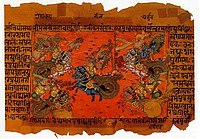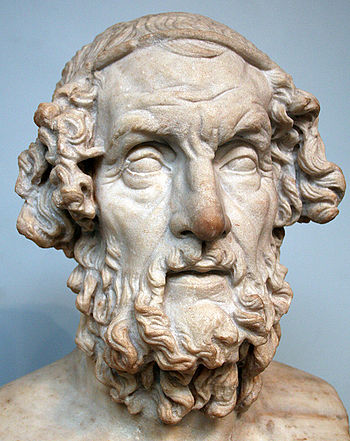
Back بوابة:شعر Arabic প্রবেশদ্বার:কবিতা Bengali/Bangla دەروازە:شیعر CKB Portal:Poesía Spanish Portail:Poésie French Portal:Poesia Occitan Портал:Поэзия Russian Портал:Шигърият Tatar Portal:詩歌 Chinese
Welcome to the Poetry Portal


Poetry (from the Greek word poiesis, "making") is a form of literary art that uses aesthetic and often rhythmic qualities of language to evoke meanings in addition to, or in place of, literal or surface-level meanings. Any particular instance of poetry is called a poem and is written by a poet. Poets use a variety of techniques called poetic devices, such as assonance, alliteration, euphony and cacophony, onomatopoeia, rhythm (via metre), and sound symbolism, to produce musical or incantatory effects. Most poems are formatted in verse: a series or stack of lines on a page, which follow a rhythmic or other deliberate pattern. For this reason, verse has also become a synonym (a metonym) for poetry.
Poetry has a long and varied history, evolving differentially across the globe. It dates back at least to prehistoric times with hunting poetry in Africa and to panegyric and elegiac court poetry of the empires of the Nile, Niger, and Volta River valleys. Some of the earliest written poetry in Africa occurs among the Pyramid Texts written during the 25th century BCE. The earliest surviving Western Asian epic poem, the Epic of Gilgamesh, was written in the Sumerian language.
Early poems in the Eurasian continent evolved from folk songs such as the Chinese Shijing as well as from religious hymns (the Sanskrit Rigveda, the Zoroastrian Gathas, the Hurrian songs, and the Hebrew Psalms); or from a need to retell oral epics, as with the Egyptian Story of Sinuhe, Indian epic poetry, and the Homeric epics, the Iliad and the Odyssey. (Full article...)
Selected article

Besides its epic narrative of the Kurukshetra War and the fates of the Kaurava and the Pandava princes, the Mahabharata contains philosophical and devotional material, such as a discussion of the four "goals of life" or purusharthas (12.161). Among the principal works and stories in the Mahabharata are the Bhagavad Gita, the story of Damayanti, an abbreviated version of the Ramayana, and the Rishyasringa, often considered as works in their own right.
Traditionally, the authorship of the Mahabharata is attributed to Vyasa. There have been many attempts to unravel its historical growth and compositional layers. The oldest preserved parts of the text are thought to be not much older than around 400 BCE, though the origins of the epic probably fall between the 8th and 9th centuries BCE. The text probably reached its final form by the early Gupta period (c. 4th century CE). The title may be translated as "the great tale of the Bhārata dynasty". According to the Mahabharata itself, the tale is extended from a shorter version of 24,000 verses called simply Bhārata.
The Mahabharata is the longest known epic poem and has been described as "the longest poem ever written". Its longest version consists of over 100,000 shloka or over 200,000 individual verse lines (each shloka is a couplet), and long prose passages. About 1.8 million words in total, the Mahabharata is roughly ten times the length of the Iliad and the Odyssey combined, or about four times the length of the Ramayana. W. J. Johnson has compared the importance of the Mahabharata to world civilization to that of the Bible, the works of Shakespeare, the works of Homer, Greek drama, or the Qur'an. (Full article...)
Selected image
Poetry WikiProject

Selected biography

Akhmatova's work ranges from short lyric poems to intricately structured cycles, such as Requiem (1935–40), her tragic masterpiece about the Stalinist terror. Her style, characterised by its economy and emotional restraint, was strikingly original and distinctive to her contemporaries. The strong and clear leading female voice struck a new chord in Russian poetry. Her writing can be said to fall into two periods – the early work (1912–25) and her later work (from around 1936 until her death), divided by a decade of reduced literary output. Her work was condemned and censored by Stalinist authorities and she is notable for choosing not to emigrate, and remaining in Russia, acting as witness to the atrocities around her. Her perennial themes include meditations on time and memory, and the difficulties of living and writing in the shadow of Stalinism. (Full article...)
Did you know (auto-generated) -

- ... that Rabia Balkhi is the first known Persian woman poet?
- ... that the fall of Sundrum Castle was alluded to in a poem by Robert Chambers in the 19th century and was later referred to as a curse?
- ... that Matei Donici, a general in the Imperial Russian Army, secretly wrote poetry with Romanian-nationalist and anti-Russian messages?
- ... that newspapers in Brazil printed cake recipes and 16th-century poetry to cover material censored by the military dictatorship?
- ... that the seafaring poet D. I. Antoniou worked on a single poem for more than a decade and ended up publishing it over thirty years later?
- ... that Eyvindur P. Eiríksson has addressed modern alienation and man's relationship with nature through pagan poetry and a book about a fishing trawler?
Selected poem
| Odyssey, book 1, first verses by Homer |
|---|
|
Muse make the man thy theme, for shrewdness famed |
Related portals
Topics
Recognized content
Categories
Associated Wikimedia
The following Wikimedia Foundation sister projects provide more on this subject:
-
Commons
Free media repository -
Wikibooks
Free textbooks and manuals -
Wikidata
Free knowledge base -
Wikinews
Free-content news -
Wikiquote
Collection of quotations -
Wikisource
Free-content library -
Wikiversity
Free learning tools -
Wiktionary
Dictionary and thesaurus
© MMXXIII Rich X Search. We shall prevail. All rights reserved. Rich X Search





















